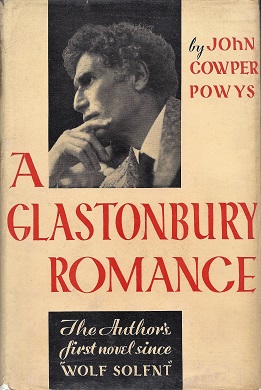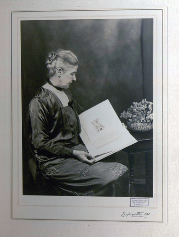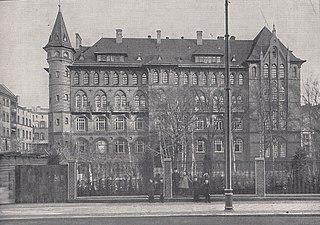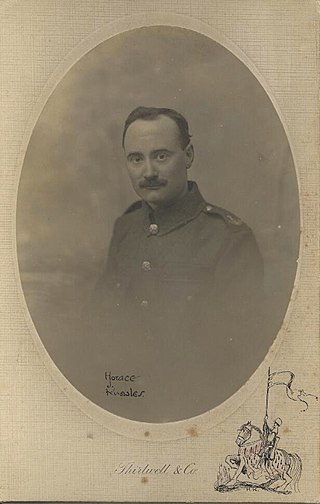
Friedrich Wilhelm August Fröbel or Froebel was a German pedagogue, a student of Johann Heinrich Pestalozzi, who laid the foundation for modern education based on the recognition that children have unique needs and capabilities. He created the concept of the kindergarten and coined the word, which soon entered the English language as well. He also developed the educational toys known as Froebel gifts.

Clementine Ogilvy Spencer Churchill, Baroness Spencer-Churchill was the wife of Winston Churchill, Prime Minister of the United Kingdom, and a life peer in her own right. While legally the daughter of Sir Henry Hozier, her mother Lady Blanche's known infidelity and his suspected infertility make her paternal parentage uncertain.

Maria Kraus-Boelté (1836–1918) was a pioneer of Fröbel education in the United States, and helped promote kindergarten training as suitable for study at university level.

A Glastonbury Romance was written by John Cowper Powys (1873–1963) in rural upstate New York and first published by Simon and Schuster in New York City in March 1932. An English edition published by John Lane followed in 1933. It has "nearly half-a-million words" and was described as "probably the longest undivided novel in English".
Froebel College is one of the four constituent colleges of the University of Roehampton.
Wellesley Tudor Pole OBE was a spiritualist and early British Baháʼí.
Bertha Ronge was an activist in the causes of childhood education, women's education and religious freedom. She established the kindergarten movement in England, where she founded the first three kindergartens in London, Manchester (1859) and Leeds (1860). She followed the precepts of Friedrich Fröbel, who advocated the use of structured play activities to promote learning. Bertha Ronge was largely responsible for Fröbel's kindergarten concept gaining a foothold in England.

Sir George William Kekewich was a British Civil Servant and Liberal Party politician.

Ibstock Place School is a private co-educational day school for pupils aged 4–18 located in Roehampton, southwest London. It was founded as the Froebel Demonstration School due to its affiliation with the Froebel Institute and adherence to Froebelian pedagogy. Ibstock Place's campus sits on a ten-acre property at the edge of Richmond Park in Southwest London.
The National Froebel Foundation (NFF) was a foundation which validated examinations and set standards for teaching training courses at pre-school level in the United Kingdom. Named after German educator Friedrich Fröbel, it began in two separate bodies; the Froebel Society of 1874 and the National Froebel Union of 1887. In 1938 the two merged to form the National Froebel Foundation. The National Froebel Foundation continued until 2012 when it merged with the Froebel Educational Institute to form the Froebel Trust. The Froebel Trust continues as the UK's charity for the promotion of Froebelian education, funding research, training and educational conferences in the UK and outreach work overseas. The NFF's practitioner network continues as the National Froebel Network.
Caroline Garrison Bishop was a British advocate for kindergartens. She co-ordinated the introduction of these ideas in London and later opened a college in Birmingham.

Julia Lloyd was a British philanthropist and educationalist. She was interested in the newly developed methods for teaching young children in kindergartens. She opened Birmingham's first nursery school based on Froebelian principles.

The Pestalozzi-Fröbel-Haus was founded in 1882. It was one of the first institutions in Germany which started to train early childhood teachers, as well as one of the first where women could get a professional training in Berlin. It practiced a belief in teaching children as individuals.

Julie Schwabe was a British philanthropist, educationalist and school founder. She founded schools in Italy and in the UK she established the influential Froebel Education Institute now known as Froebel College.

Horace John Knowles was an author and illustrator. He is remembered mostly for magical depictions of Fairyland in his magnum opus Peeps into Fairyland, as well as for his biblical illustrations. For his first two published books, Legends from Fairyland (1908) and Norse Fairy Tales (1910), he collaborated with his brother Reginald L. Knowles.

William Edwin Worrall (1877-1940) was a Staffordshire-born designer of fabric, pottery, glass and stoneware. He was the brother of the watercolour painter Thomas Frederick Worrall and shared similar artistic ability.
Caroline Herford MBE, later Caroline Herford Blake (1860–1945) was an English educationist.

Eleonore Heerwart was a German kindergarten teacher, educator and writer.
Jane Annie Roadknight born Jane Annie Powell was a British schoolteacher and inspector of schools. She was an advocate of the kindergarten and Froebel approach to education.













